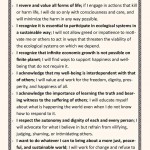 Sometimes I notice stress sneaking into my life. It starts accumulating under the surface of everything, making me irritable and somewhat sad.
Sometimes I notice stress sneaking into my life. It starts accumulating under the surface of everything, making me irritable and somewhat sad.
Usually this has to do with anxiety about the future. It’s important to note this anxiety is pretty unspecific and open-ended. It’s not that I’m biting my nails because X might happen. It’s more a general sense of dread about the myriad ways everything in my life could fall apart and how things could become miserable and unworkable.
Feeling anxiety and dread about how things might change for the worse is a common and natural human experience. If you don’t feel these things occasionally, you’re probably in denial or deliberately keeping yourself numbed out.
Most people seem to deal with stress about the future by trying to convince themselves that everything will work out okay. They console themselves and others with reassurances that the worst won’t happen, or that any looming cloud is actually just a nice silver lining in a scary package. But all you have to do is look around to see that sometimes the worst does happen, and sometimes life can pretty damn tough.
Zen suggests we deal with our dread about impermanence another way: by facing it and accepting it. That doesn’t mean accepting whatever terrible thing comes our way without trying to make our lives as comfortable and manageable as we reasonably can. It does mean giving up the delusion that we can prevent traumatic changes by wishing they wouldn’t happen.
It’s funny how we fool ourselves into thinking that worrying improves our chance of success. Because we have the capacity to anticipate challenging and painful events we think we need to do so – all day, every day. Not just when we need to make decisions or plans. We maintain a default background of worry, keeping our eye on the moving ball of disaster.
Fortunately, it’s possible to let go of our resistance to impermanence (that is, change, which inevitably will be, at some point, uncomfortable). We can’t do it by simply willing ourselves not to worry. Instead, we stand straight and tall right right where we are. We recognize we have capacities and resources. If they aren’t enough to prevent or deal with some approaching difficulty, there’s not much we can do about that. Nonetheless we can arouse a determination to do the best we can with what we have, come what may. We realize worry only depletes our energy and compromises our life.
We can let go of worry even as we use all of our intelligence to make wise choices. This isn’t about turning off our discriminating mind and cultivating a delusion that all will be well no matter what. All will not be well. That’s one thing we can be sure of.
One of the first, basic Buddhist teachings is that all existence is marked by impermanence, and because of this we find life to be dissatisfying. We can’t hold on to anything. However, another basic Buddhist teaching is that we can overcome this dissatisfaction by letting go of desire – that is, the desire for things to be other than how they are.
The relief we obtain by letting go of worry about change is not based on logic. From the outside it doesn’t even make much sense, and mere intellectual acceptance of the premise doesn’t help. This teaching is experiential. When I let go of worry I feel better. I feel more clear, more able to respond appropriately, even more able to plan wisely. And I can enjoy things as they are, right now, instead of letting them be compromised with anxiety and fear.












